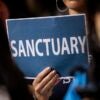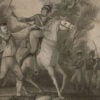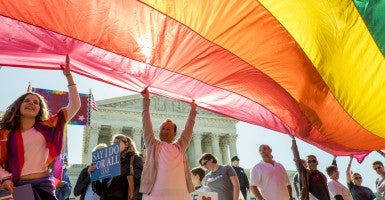Do special rights for some get in the way of civil liberties for others?
A prominent voice for the historic view of marriage, Ryan T. Anderson, agreed to disagree while speaking at a summit Thursday in Washington, D.C., addressing issues of importance to lesbian, gay, bisexual, and transsexual activists.
“What we want here is equality under the law, not creating a special category for a protected class,” Anderson, the William E. Simon senior research fellow at The Heritage Foundation, said at The Atlantic LGBT Summit. “Part of freedom is going to have to be the right to disagree about the truth.”
Nearly 300 attended the summit over the course of the event. Mary Louise Kelly, a contributing editor for The Atlantic magazine, said many of about 20 featured speakers at the summit “accept marriage equality as the new normal” and favor of federal anti-discrimination laws like the Equality Act.
“The Equality Act is a problem because it stigmatizes certain viewpoints in the United States,” Anderson said.
If passed by Congress, the Equality Act would prohibit discrimination based on sex, sexual orientation and gender identity in public places, broadening the definition of the Civil Rights Act of 1964.
Anderson argued:
I think all human beings have innate and intrinsic dignity [and] need to be protected in law on an equal basis. My only hesitation here is about whether or not we want to elevate sexual orientation and gender identity to a protected class. Because that goes beyond equal treatment under law into singling out a particular identity and particular character trait that would now be gaining extra protections in the law.
The Atlantic’s Kelly asked Anderson whether those who identify as lesbian, gay, bisexual, or transgender are entitled to the same protections and privileges under the Constitution as anyone else. Anderson quickly responded, “Of course, yes.” He added:
Gays and lesbians need to be free to live and love how they want to, but other people need to be free to live and to work and to run schools and charities in accordance with their beliefs. It needs to be a two-way street.
Anderson’s research was cited by Supreme Court justices in two separate marriage cases. He is the author of two books on marriage.
At the LGBT summit at Woolly Mammoth Theatre, he said a person does not have to be religious to believe that marriage is between a man and a woman.
Religious liberty, however, has been at the forefront of the debate regarding same-sex marriage. Some Americans have been fined for not providing services (such as cakes and photographs) for same-sex weddings. After refusing to make a floral arrangement for a gay couple’s wedding, a Washington florist was labeled a “bigot” for her Christian beliefs on marriage.
“I don’t deny that bigotry exists, but I don’t think the baker, the florist, or the photographer are acting out of a bigoted viewpoint in that situation. I think that’s where we’re going to have to agree to disagree,” Anderson told the audience.
Anderson stated his belief that “everyone should have equal rights.” Meaning, he said, “the baker is free to bake cakes in accordance with her beliefs and the same-sex couple is free to get whatever cake they want from whatever bakery wants to bake them that cake.”
Anderson added:
If you’re a conservative evangelical at a major law firm or at an Ivy League university, you have a much harder time coming out of the closet as a conservative evangelical than you do coming out as gay, lesbian, bisexual, or transgender. That’s an empirical question, but from my experience at Princeton, and that was a decade ago that I was there, was that it was much more a contentious subject to say that you were opposed to same-sex marriage than to say you were in favor of it.
Last month, a Bermuda hotel canceled two talks on same-sex marriage by Anderson, declaring that the events were “anti-diversity.” Anderson said he doesn’t think the hotel made the best decision, but he won’t file a lawsuit.
“I think they have a right to do the wrong thing,” he said. “Freedom’s a two-way street. You’re free to bake the cake or not. You’re free to host the talk or not.”





























